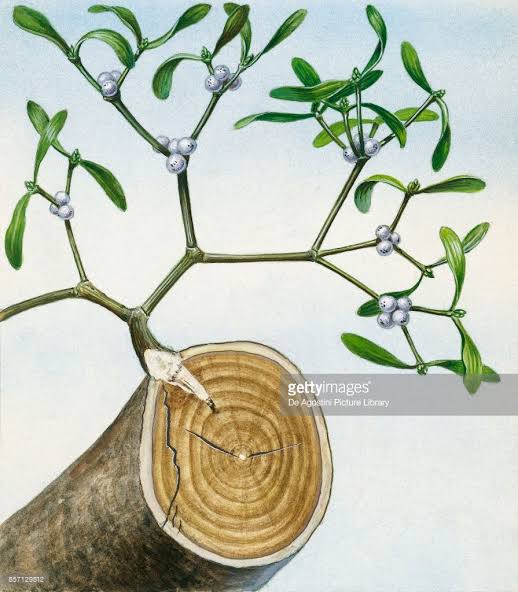HEALTH BENEFITS OF "MISTLETOE" PLANT
INTRODUCTION

image source
Mistletoe is an obligate hemiparasite plants that attaches itself to a host plant (tree, shrub), thereby penetrating directly into the host branches to absorb nutrients and water for survival through the use of the "haustorium".
.jpg)
image source haustoria
Their most distinctive unifying features is due to their parasitic behaviour exhibited the mistletoes. Mistletoe is distributed in vast amount around the world, belonging to the order Santalaceae which is native to Great Britain and many European countries.
They are classified in diverse genera and even families such as the Loranthaceae and the Misodendraceae.
They are seen to parasitize certain plants such as: Theobroma cacao (cocoa), Dacryodes edulis (native pear), Persia americana (pear), Albezia, Magnifera indica (mango), Citrus (sinensis, guajava etc).

image source: mistletoe on citrus
They are harvested fresh and extracted for laboratory analysis, as well as can be dried and crushed into bags for beverage use.
HEALTH BENEFIT OF MISTLETOE

image source
Antioxidant, Antibacterial and Antiviral Abilities:
The antioxidant, antibacterial and antiviral activities of mistletoe makes it a perfect "line of defense" in boosting the immune system regardless of the illness or state of the immune system.These abilities, makes mistletoe an overpriced herb for cancer treatment as it boost and probably protects the immune system from illness.
Promote Good Quality Sleep:
.jpg)
image source
The phytochemical components of mistletoe, impacts the release of neurotransmitters that calms down and soothen the nervous system thereby promoting good and quality restful sleep.
Summarily, the mistletoe extract when wholly or mixed with other supplements, can reduce /control Insomnia (restlessness, resulting from the inabilitty to sleep).
Reduces Blood Pressure:
.jpg)
image source
This abilities are most conspicuous in the European and Japanese varieties. The mistletoe plant has a commensurable effect on treating hypertension which affects a vast number of people around the world.
With the attributing characteristics of lowering blood pressure, it's plant extract is able to dwindle the stress and strain exerted on the cardiovascular system. It also trims-down clogged arteries (atheriosclerosis).
Atheriosclerosis usually results from the accumulation /build up of various dead cell of the cholesterol and triglycerides. These dead cells are attacked by the Leukocytes in other to savage or remedy the situation, but they further add to the blockage and narrowing of the blood vessels. Blood pressure is thereby increased as a result of out over working the heart to pump blood. The mistletoe extract can help prevent heart attacks, strokes, coronary heart diseases through its suppression on hypertension.
Cancer Treatment:
.jpg)
image source
Without much disputing, the Germaine and widely studied aspect of mistletoe's health benefits is it's unprecedented role in treating tumor (cancerous cells).
Research has been able to link the extract of mistletoe with anti-cancer activities. In Europe, over fifty percent (50%) of its cancer patients now incorporate mistletoe in their treatment regimen. It has been found that certain types of cancer, experience Apoptosis (programmed cell death) in cancerous cells. Mistletoe extracts have a high overall quality of life for patients, tumor shrinkage and healthier blood count etc.
The three most frequently prescribed conventional cancer therapies are surgery, radiation therapy and chemotherapy. Mistletoe is largely used as a complementary cancer therapy in combination with conventional therapies for an integrative approach to the treatment of cancer in both humans and animals. Mistletoe is commonly used with conventional cancer therapies to prevent and decrease the adverse effects of conventional cancer therapies.
In other words, mistletoe can help support the continued use of conventional drugs to fight the cancer instead of stopping treatment due to side effects. Mistletoe can be safely combined with chemotherapy and radiotherapy, before, during and after treatment. It can also be given before and after surgery to decrease developmen of metastatic disease and to boost immune function post-operatively.
Mistletoe can also be used as a primary cancer therapy when conventional cancer therapy is not possible due to adverse side effects, weakness of the patient and when conventional treatment has proven ineffective. Mistletoe is often combined with acupuncture and other alternative therapies (herbal medicine, nutritional therapies) for the treatment of cancer in these cases.
Varieties of Cancers Treated with Mistletoe:
Mistletoe therapy can be used to help treat most types of cancer due to its broad-spectrum anti-cancer effects, however it works best for solid tumor cancers. It is particularly useful for the treatment of lymphoma, mast cell tumor, sarcomas, mammary cancer, bladder, gastro-intestinal, lung and liver cancer. It is often combined with conventional and other complementary therapies for an integrative approach to cancer therapy in order to achieve the best clinical results.How Does Mistletoe Treat Cancer?:
Mistletoe extracts provide a variety of anti-cancer effects. There is extensive research and clinical trials that support the safety and efficacy of mistletoe in the treatment of cancer. Some of the major effects include:- Anti-tumor effects; shrinks tumors via cytotoxic mechanisms and slows their growth
- Immunomodulatory effect; enhancement of immune function, programmed triggering of tumor cell death (apoptosis), and DNA protection.
- Anti-metastatic; prevents the development of metastatic disease
- Reduces the occurrence and severity of the side effects of chemotherapy and radiation therapy
- Increased survival times and reduction of cancer recurrence
- Promotes a high quality of life (increase in appetite and weight and energy)
Side Effects Associated with Mistletoe Therapy?:
Mistletoe has been used to treat cancer since the 1920’s. There have been no reports of significant side effects associated with its use as a single agent or in combination with conventional cancer drugs or radiation.How Is Mistletoe is Administered?:
Mistletoe is typically administered by subcutaneous injection using small gauge needles (27gauge) on a weekly basis. In some cases, the veterinarian may also inject it into specific acupuncture points. The IVC staff will give the first injections, and then the owner is taught how to do subsequent injections at home.Alternatively if you and your pet live nearby, IVC staff can perform the injections on a weekly basis for you. Two to three injections of Mistletoe per week are required to treat most cancers, and it is recommended that the injections be given in the morning. The injection site should be rotated to prevent irritation. We will show you the best sites for injection. Acupuncture points for mistletoe injection are variable and depend on a number of factors determined by the veterinarian.Recommended subcutaneous injection sites:
- Abdominal wall
- Chest Wall
- Inner thigh
- Near the tumor
- Specific acupuncture points
Soothes Respiratory Distress:
.jpg)
image sourcsource
Mistletoe helps to calm the respiratory system in case of irritations or disorders, which ranges from wheezing or coughing, to sore throats and bronchial inflammation. I has shown it's potency or ability in dwindling the irritation and lowering of the discomfort and stiffness in the chest cavity.
Flexes and Reduces Menstrual Distress:
.jpg)
image source
The use of mistletoe is viable in reducing excessive cramps and menstrual pains.
It helps to calm muscle spasms and inflammation, aiding to unleash cramping and tension.
NB: Before use, please speak to your doctor be do remember incorporating a nervine tonic like mistletoe to your diet, especially during pregnancy or when you are considering to become pregnant.
Regulates Snoring:

image source
A cup of mistletoe tea before going to bed can promote restful sleep and soothe the nerves, as well as soothing respiratory distress. This therefore promote the chance of not snoring during sleep.
REFERENCES
- drugs
- sciencedirect
- bmccancer
- nejm
- sciencedirect
- thenaturedoctors
- bmj
- sciencedirect
- lww
- ncbi
- tubitak
- ncbi
